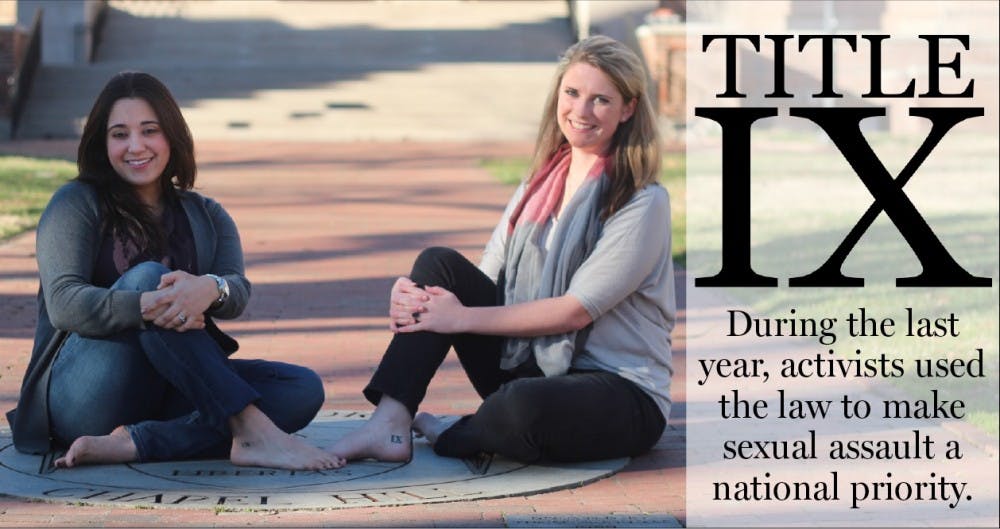This time last year, Pino was enrolled in professor Frank Baumgartner’s policy framing class. She studied previous media coverage of sexual assaults at Yale and Amherst and wrote a paper about making UNC’s crisis a national call to change — a response that failed to materialize in past cases.
She argued the problem was threefold: there was always an anonymous “Jane Doe” and never a classmate visible in previous cases, separate assaults at separate schools were framed as independent problems and the issue often arose at prestigious schools with sterling reputations.
The day Pino turned in her paper, The New York Times published an article featuring her and Clark. Suddenly, the strategies in the paper had a national audience.
And Sofie Karasek, a student at the University of California, Berkeley, was paying attention.
“I couldn’t even get through the article, I was looking for names of people to find on Facebook,” she said.
Like Pino and Clark, she had gone to her school to report her assault. After coming forward with several other women, she says her school ignored her.
“I just felt like nothing was going to come of it,” she said. “It didn’t even occur to me that I might have some legal rights, or rights federally.”
Karasek was one of a growing number of students who took a strategy developed at UNC and adapted it to her own situation.
In California, state auditors are now reviewing sexual assault policies at multiple state institutions because of the complaint.
During the last year, Pino advised survivors dealing with similar circumstances at schools on the east coast, including Swarthmore College in Pennsylvania and Dartmouth College in New Hampshire. Clark took on West Coast colleges, including Occidental College in California, University of Southern California and University of California, Berkeley.
Students filed complaints at these schools and the movement grew. Clark said the action gave survivors legitimacy in the eyes of the public and the media.
“Everyone said call us back when you file,” Clark said. “Nobody took us seriously.”
To get the day's news and headlines in your inbox each morning, sign up for our email newsletters.
But the pair doubt the complaints, including their own, will result in action by the Department of Education.
“You could have talked to me a year ago and I would have been a lot more hopeful — granted I am still hopeful that our activism can lead to positive change — but the issue is the (Office of Civil Rights) in itself does not really hold schools accountable,” Pino said.
The Daily Tar Heel reached out to a spokesman for the U.S. Department of Education, but didn’t receive a response.
But more important to Pino and Clark than the results of any investigation is the coalition of student groups they have helped form over the last year, which they call the “IX Network.” These include “Know Your IX,” a campaign to educate students about how to file Title IX complaints, End Rape on Campus, a service to help students file complaints and a private Facebook group for survivors to talk about their experiences. Pino said nearly 1,000 students are part of the IX Network.
“I think that now unlike before we have a national network of students connecting across the country,” Karasek said. “That is very powerful. It shows solidarity, but also it puts pressure on the universities to do better.”
But as the national buzz reached an all-time high, discussion at UNC has become more private.
Hurt said conversation is focused on providing “no wrong door” for students and the resources for survivors to find them.
“I don’t think the conversation has died down at all,” Hurt said. “It may not be as public, but it may even be more robust.”
Still, Pino says she is discouraged by decreased visibility as she returns to campus after taking a semester off.
“I feel that since I have become more of a national figure, I can continue doing national activism. I can hold other campuses accountable,” Pino said. “But what can I do at UNC anymore?
“What do I want to do before I turn my tassel?”
She said there’s work to do. She wants to ensure the newly formed Title IX office is a resource for students and not a defense against a law suit. She wants to expand resources for survivors seeking help.
She wants to graduate.
Pino hasn’t forgotten what student action can do. She came to know Clark because she created the system of anonymous reporting in the Union bathrooms that Pino used to report her own assault.
Still, many students doubt the pair. Pino says it’s not hard to understand why.
“We enter this institution with the belief that it’s a haven. It’s the southern part of heaven. It’s everything we are excited and proud to be a part of,” Pino said. “To think that bad things happen within our family — it’s just the ultimate betrayal.”
“It strikes at the heart of every Tar Heel and people don’t want to side with that.”
In the next semester, Pino said she will seek to convince the doubters that if they love their school, they will help change it.
Click here for an interactive map of sex crimes on campus and a list of resources for sexual assault survivors.
university@dailytarheel.com



